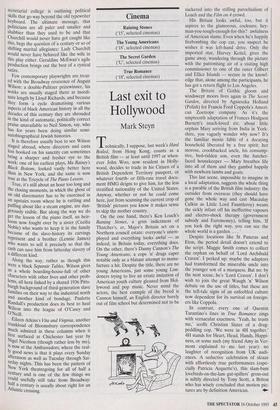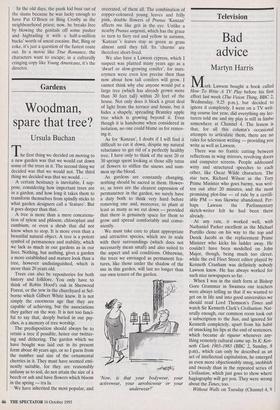Cinema
Raining Stones (`15', selected cinemas) The Young Americans (`18', selected cinemas) The Secret Garden (`U', selected cinemas) True Romance (`18', selected cinemas)
Last exit to Hollywood
Mark Steyn
Technically, I suppose, last week's Hard Boiled, from Hong Kong, counts as a British film — at least until 1997 or when- ever John Woo, now resident in Holly- wood, decides to trade in his Citizen of a British Dependent Territory passport, or whatever fourth- or fifth-rate travel docu- ment HMG deigns to give him, for the less stratified nationality of the United States. Anyway, whether or not he could come here, just from scanning the current crop of `British' pictures you know it makes sense to skip the mother country. On the one hand, there's Ken Loach's Raining Stones, a grim indictment of Thatcher's, er, Major's Britain set on a Northern council estate: everyone's unem- ployed and everything looks awful — as indeed, in Britain today, everything does. On the other, there's Danny Cannon's The Young Americans, a cops 'n' drugs caper notable only as a blatant attempt to manu- facture a hit. Despite the title, there are no young Americans, just some young Lon- doners trying to live an ersatz imitation of American youth culture gleaned from Hol- lywood and pop music. Never mind the actors, the best example of the breed is Cannon himself, an English director barely out of film school but determined not to be suckered into the stifling parochialism of Loach and the Film on 4 crowd.
His Britain looks awful, too, but it aspires to the glamorous, cocksure, hey- man-you-tough-enough-for-this? awfulness of American slums. Even when he's happily firebombing the cop car, you suspect he wishes it was left-hand drive. Only the imported star, Harvey Keitel, gives the game away, wandering through the picture with the patronising air of a visiting high commissioner to one of the outer Gilbert and Ellice Islands — secure in the knowl- edge that, alone among the participants, he has got a return flight to Los Angeles.
The Britain of Gothic gloom and windswept moors lives again in The Secret Garden, directed by Agnieszka Holland (Polish) for Francis Ford Coppola's Ameri- can Zoetrope company. As it's the umpteenth adaptation of Frances Hodgson Burnett's much-loved etc. about little orphan Mary arriving from India in York- shire, you vaguely wonder why now? It's the familiar movie fable of a decaying household liberated by a free spirit: her morose, crookbacked uncle, his consump- tive, bed-ridden son, even the hatchet- faced housekeeper — Mary breathes life into all of them and they gambol happily with newborn lambs and goats.
This last scene, impossible to imagine in a local adaptation, suggests the whole thing is a parable of the British film industry: the outsider from overseas (they should have gone the whole way and cast Macaulay Culkin as Little Lord Fauntleroy) weans the sickly infant off his ineffective vapours and electro-shock therapy (government subsidy and Euromoney), telling him, 'If you look the right way, you can see the whole world is a garden. . . . '
Despite locations like St Pancras and Eton, the period detail doesn't extend to the script. Maggie Smith comes to collect the orphan on behalf of 'Lord Archibald Craven'. I perked up: maybe the adaptors had transformed the miserable uncle into the younger son of a marquess. But no: by the next scene, he's 'Lord Craven'. I don't wish to join the great Waugh 'n' Wilson debate on the use of titles, but these are the tell-tale signs of an enfeebled culture now dependent for its survival on foreign- ers like Coppola.
In contrast, every one of Quentin Tarantino's lines in True Romance zings with vernacular exactness. 'Yeah, he trusts me,' scoffs Christian Slater of a drug- peddling cop, 'We were in 4H together.' 4H stands for Heart, Head, Hands, Happi- ness, or some such (my friend Amy in Ver- mont explained to me last year): no laughter of recognition from UK audi- ences. A seductive celebration of sleaze with effortlessly true performances (espe- cially Patricia Arquette's), this slam-barn lovebirds-on-the-lam gut-spillers' gross-out is niftily directed by Tony Scott, a Briton who has wisely concluded that motion pic-
tures are by definition American. ► In the old days, the punk kid bust out of the slums because he was lucky enough to have Pat O'Brien or Bing Crosby as the neighbourhood priest; now, he breaks free by blowing the genitals off some pusher and hightailing it with a half-a-million bucks' worth of uncut cocaine. But, Bing or coke, it's just a question of the fastest route out. In a movie like True Romance, the characters want to escape; in a culturally cringing copy like Young Americans, it's the director.



























































 Previous page
Previous page